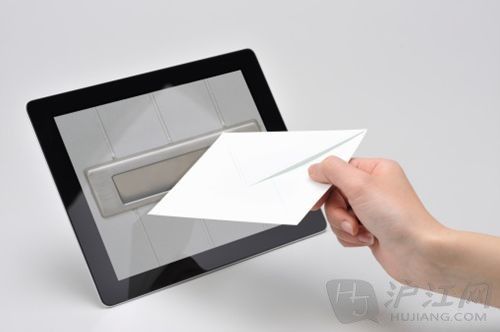双语:五封黄金必胜电子邮件带你走向成功
 五封黄金必胜电子邮件带你走向成功
五封黄金必胜电子邮件带你走向成功
 五封黄金必胜电子邮件带你走向成功
五封黄金必胜电子邮件带你走向成功
 五封黄金必胜电子邮件带你走向成功
五封黄金必胜电子邮件带你走向成功
 五封黄金必胜电子邮件带你走向成功
五封黄金必胜电子邮件带你走向成功
 五封黄金必胜电子邮件带你走向成功
五封黄金必胜电子邮件带你走向成功
 五封黄金必胜电子邮件带你走向成功
五封黄金必胜电子邮件带你走向成功
I’ve covered a lot of research on how to make your life better but many people struggle with implementing changes because it seems like a major undertaking. It doesn’t have to be。我已经给大家介绍了很多能让你的生活更加美好的研究,但是很多人挣扎着进行改变,因为这看来像是一项重大任务。其实不必如此。
You can make strides in 5 fundamental areas by just sending 5 emails。你只需发送5封电子邮件,就可以在5个重要领域内取得进步。
HAPPINESS幸福
Every morning send a friend, family member or co-worker an email to say thanks for something。每天早晨,给朋友、家人或同事发封电子邮件, 向他们表示感谢。
Might sound silly but there’s tons and tons and tons of research showing that over time, this alone – one silly email a day – can make you happier。这种做法听上去有点儿傻,但是大量的研究表明,随着时间的流逝,这种做法——每天发一封这样的邮件——可以让你更加幸福。
Via Harvard professor Shawn Achor’s The Happiness Advantage:哈佛大学肖恩-阿克尔教授的《幸福优势》中有这样一段话:
This is why I often ask managers to write an e-mail of praise or thanks to a friend, family member, or colleague each morning before they start their day’s work—not just because it contributes to their own happiness, but because it very literally cements a relationship。这就是为什么我让经理们每天早晨在开始一天的工作前向朋友、家人或同事写一封赞美或感谢的电子邮件——不仅仅是因为这样会增进他们自己的幸福感,而且因为这样能用文字的方式巩固彼此间的关系。
JOB工作
At the end of the week, send your boss an email and sum up what you’ve accomplished。在一周工作结束的时候,向老板发封电子邮件,总结一下你所完成的工作。
They probably have no idea what you’re doing with your time. They’re busy. They have their own problems。他们可能并不知道你都做了些什么。他们很忙。他们有自己的难题。
For your boss, this let’s them know what you’ve been up to without having to ask and saves them from wondering and worrying. They’ll appreciate it and probably come to rely on it。对你的老板来说,这样做能让他们知道你都做了什么,让他们不必去问,让他们不必好奇和担心。他们会欣赏这一做法,很可能慢慢地依赖上它。
For you, it’s proactive and shows off your efforts, which Stanford professor Jeffrey Pfeffer is the key to success in any organization:对你来说,这是种积极主动的行为,显示出了你的努力,斯坦福大学杰弗里-普费弗教授认为它是任何组织成功的关键。
…you should make sure that your performance is visible to your boss and your accomplishments are visible. Your superiors
in the organization have their own jobs, are managing their own careers, are busy human beings. And you should not assume that they’re spending all their time thinking about you and worrying about you and your career.…你应该确保你的老板能看到你的表现, 也能看到你的成就。在组织中你的上级有自己的工作,管理着他们自己的职业,他们非常忙。你不要认为他们会花所有的时间来思考你的事情,担心你和你的职业。
GROWTH成长
Once a week email a potential mentor。每周给一名潜在的导师发封电子邮件。
Doesn’t have to be related to your job. Who do you admire that you could learn from?不一定非得和工作相关。 谁是你崇拜并想学习的人?
As I’ve blogged about before, mentors are key to success。就像我以前博客里写的那样,导师是成功的关键。
Via The Genius in All of Us: New Insights into Genetics, Talent, and IQ:《天才的基因:关于IQ、天赋与遗传基因》中的一段话:
Any person lucky enough to have had one great teacher who inspired, advised, critiqued, and had endless faith in her student’s ability will tell you what a difference that person has made in her life. “Most students who become interested in an academic
subject do so because they have met a teacher who was able to pique their interest,” write Csikszentmihályi, Rathunde, and Whalen. It is yet another great irony of the giftedness myth: in the final analysis, the true road to success lies not in a person’s molecular structure, but in his developing the most productive attitudes and identifying magnificent external resources。任何人遇到能启发、建议、批评并相信学生能力的好老师都非常幸运,他们会告诉你老师让他的生活发生了何种变化。“大部分对学术研究感兴趣的人都是因为他们遇到了能激起他们兴趣的老师,” 米哈伊、拉桑德和惠伦写到。这又是天赋神话的一大讽刺:在最终的分析中,通往成功真正的道路不在于个人的分子结构,而在于他养成最有效率的心态和识别出好的外部资源。
This is one of those things everyone seems to know but nobody does anything about。这一点儿大家好像都知道,但是却没人去做。
It’s the age of the internet, folks. If you have a Google and half an ounce of resourcefulness it’s not that hard to find almost anyone’s email address. If they have a website, their email is probably listed on it。朋友们,现在是互联网时代。如果你知道Google, 用一点儿小聪明,基本上任何人的电子邮件地址都不难找到。如果他们有网站,那他们的电子邮件地址也可能就列在上面。
FRIENDSHIP友谊
Email a good friend and make plans。给好朋友发电子邮件并制定计划。
What does research say keeps friendships alive? Staying in touch every 2 weeks。研究表明如何能保持友谊? 每两周联系一次。
Got 14 friends? Then you need to be emailing somebody every day。有14个朋友?那你需要每天都给一个朋友发封电子邮件。
And what should you email them about? Make plans to get together。那写些什么内容呢? 制定相聚的计划。
Research shows the best use of electronic communication is to facilitate face-to-face interaction:研究表明,使用电子方式联系的最佳方式是用它协助面对面的交互。
The results were unequivocal. “The greater the proportion of face-to-face interactions, the less lonely you are,” he says. “The greater the proportion of online interactions, the lonelier you are。” Surely, I suggest to Cacioppo, this means that Facebook and the like inevitably make people lonelier. He disagrees.Facebook is merely a tool, he says, and like any tool, its effectiveness will depend on its user. “If you use Facebook to increase face-to-face contact,” he says, “it increases social capital。” So if social media let you organize a game of football among your friends, that’s healthy. If you turn to social media instead of playing football, however, that’s unhealthy。结果是很明确的。“面对面交互的部分越多,你感到孤独的可能性就越少,”他说到。“在线交互的部分越多,你就会感到越孤独。” 当然,我给卡西奥普建议到, 这表明Facebook和类似的网络联系方式不可避免地让人感到孤独。 他不同意我的看法。他说,Facebook只是一个工具,像其他工具一样,它的有效性取决于用户。“如果你使用Facebook来增加面对面的交流,”他说,“这会增加社交资本。” 如果你用社交媒体在朋友间组织一场足球赛,这是有益健康的。但如果你使用社交媒体代替踢足球,那就不健康了。
CAREER事业
Send an email to someone you know (but don’t know very well) and check in。给你认识(但不是很熟)的人发封电子邮件并联系一下。
These “weak ties” are the primary source of future career opportunities。这些“弱关系”是未来职业机遇的主要来源。
From Charles Duhigg’s excellent book The Power of Habit: Why We Do What We Do in Life and Business:查尔斯-杜希格的优秀著作:《习惯的力量:为什么我们这样生活,那样工作?》中的一段话:
In fact, in landing a job, Granovetter discovered, weak-tie acquaintances were often more important than strong-tie friends because weak ties give us access to social networks where we don’t otherwise belong. Many of the people Granovetter studied had learned about new job opportunities through weak ties, rather than from close friends, which makes sense because we talk to our closest friends all the time, or work alongside them or read the same blogs. By the time they have heard about a new opportunity, we probably know about it, as well. On the other hand, our weak-tie acquaintances— the people we bump into every six months— are the ones who tell us about jobs we would otherwise never hear about。事实上,在找工作方面,格兰诺维特发现,弱关系比强关系要更重要,因为弱关系能让我们能接触到新的社交圈。格兰诺维特研究的很多人都是通过弱关系找到了新的工作机会, 而不是通过亲近的朋友找到的。这也讲得通,因为我们一直和亲近的朋友交流, 或和他们一起工作或阅读相同的博客。当他们听到新的机会时,我们可能也知道了。另一方面,我们的弱关系——每六个月碰见一次的人——会告诉我们从没听说过的工作机会。
“But I don’t know what to say。” Do any little thing that benefits them, not you. Try Adam Rifkin’s 5 minute favor。“但我不知道说什么。”做一些小事情,让他人受益,而不是让自己受益。试试 亚当-里夫金的5分钟助人为乐。
Or just send them a link they might find useful。或给他们发送一个对他们可能有用的链接。
- 白领必读:电子邮件写作十大技巧(双语)2013-07-19 10:49
- 双语:另类派对教你如何高效理电子邮件2013-06-27 14:59
- 双语:错发私人电子邮件处理攻略2013-06-13 12:03
- 职场必备:六招打造黄金必胜电子邮件(双语)2013-04-18 14:29
- 电子邮件常用语2012-06-19 14:28
- 白领私家绝招:电子邮件何时发最有效?(图)2012-05-10 09:53
